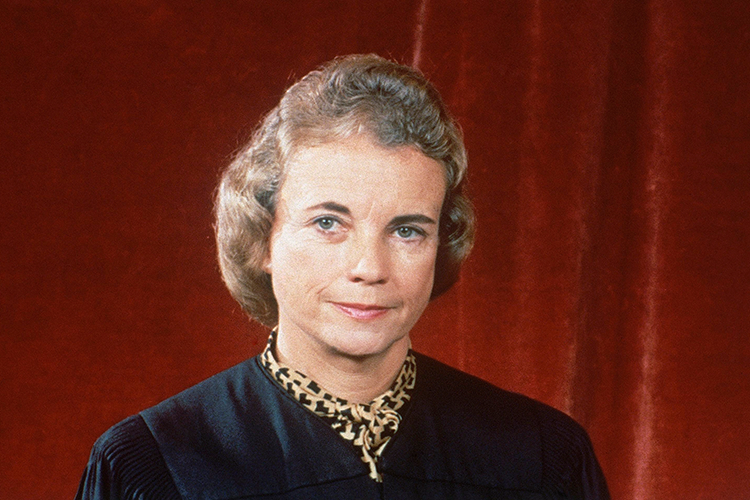U.S. Supreme Court
Former Justice Sandra Day O’Connor dies at 93
U.S. Supreme Court Justice Sandra Day O’Connor sits for her official court photo in 1982, a year after she joined the court. (AP Photo, File)
Former Justice Sandra Day O’Connor, the first woman to join the U.S. Supreme Court, has died in Phoenix at the age of 93.
A U.S. Supreme Court announcement said the cause of death on Friday was due to complications from dementia, likely Alzheimer’s disease, as well as a respiratory illness, report the Washington Post, the New York Times and CNN.
O’Connor had announced she had early-stage dementia in October 2018. She had retired in 2006 to help her husband, John O’Connor, who also had Alzheimer’s disease. He died in 2009.
O’Connor grew up on a ranch where her chores included roping calves. She attended Stanford Law School and graduated near the top of her class, but she could not find a job in BigLaw. She began practice as a solo practitioner, became an assistant attorney general in Arizona, served in the Arizona state senate, became a state judge and was elevated to the Arizona Court of Appeals.
She was an Arizona state appeals judge when then-President Ronald Reagan nominated her to the U.S. Supreme Court on Aug. 19, 1981. The Senate confirmed her nomination in a 99-0 vote on Sept. 21, 1981.
The ‘O’Connor court’
Though O’Connor served with Chief Justice William H. Rehnquist, the court was often called the O’Connor court because of her power as a centrist, the New York Times reports.
“Very little could happen without Justice O’Connor’s support when it came to the polarizing issues on the court’s docket, and the law regarding affirmative action, abortion, voting rights, religion, federalism, sex discrimination and other hot-button subjects was basically what Sandra Day O’Connor thought it should be,” the Times reported.
O’Connor had been described as a pragmatist on the court who was concerned with the real-world implications of her decisions.
O’Connor co-wrote the principal opinion in the 1992 decision Planned Parenthood v. Casey. The decision upheld the core of Roe v. Wade but said abortions could be regulated before viability if the restrictions didn’t place an undue burden on access to abortion.
She also wrote the opinion in the 2003 case Grutter v. Bollinger, which upheld the use of affirmative action in admissions at the University of Michigan Law School.
In what may have been her most controversial opinion, O’Connor joined with conservative justices in the 2000 case Bush v. Gore. The decision ended the Florida recount and paved the way for the presidency of George W. Bush. The Sandra Day O’Connor Institute for American Democracy lists all of her opinions.
‘A tireless advocate’
After her retirement, O’Connor acted as a visiting judge on federal appeals courts and promoted civics education. She created a free iCivics website and was a special adviser to the ABA Commission on Civic Education in the Nation’s Schools.
O’Connor told the ABA Journal in 2011 that, when she went to school, “we had all kinds of courses on civics and government.” That kind of education was no longer required in many schools, she said, and it’s reflected in polls that show “barely one out of three Americans can name the three branches of government, let alone describe what they do.”
O’Connor also became alarmed about efforts to politicize the judiciary and “punish” judges for the decisions. When she and then-Justice Stephen G. Breyer held a conference in 2006 to examine the problem, attendees said education was key to preserving judicial independence.
ABA President Mary Smith said in a statement that O’Connor “was a great friend to the American Bar Association” where she remained active after her Supreme Court retirement.
She worked “as a tireless advocate for judicial independence and the rule of law throughout the world until her illness forced her to retire from public life in 2018,” Smith said.
“The ABA is gratified O’Connor was involved in its programs throughout her career,” Smith said. “She was a board member for the ABA Central European and Eurasian Law Initiative, received the Margaret Brent Award in 2000 and served as a panelist decrying cuts in judicial funding at the ABA Annual Meeting in Toronto in 2011.
“While the nation has lost a legal giant and pioneer, the American Bar Association joins the rest of the world in celebrating O’Connor’s well-lived life and important legacy.”
See also: New PBS documentary examines Justice Sandra Day O’Connor’s legacy




